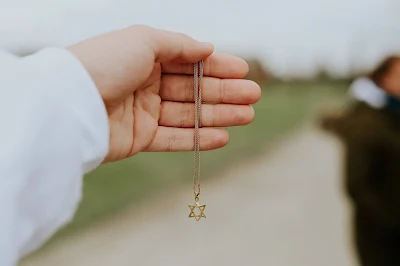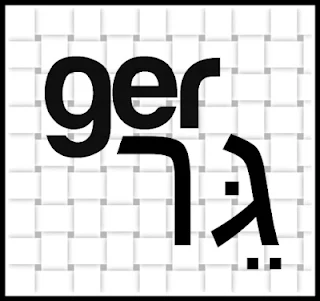This is the first in the Women's Edition of a series called The Tzniut Project 2.0. For the Women's Edition, women from a variety of backgrounds with a variety of observances have volunteered to anonymously answer questions that I have written about their practices, people's assumptions, and more. For more information on origins the project, click here.
Please continue to check back with The Tzniut Project to read more stories and comment abundantly! For the Men's Edition, pop over here.
Note: This post is contributed by a reader in France whose first language is not English. I did my best to create clarity and provide translations where necessary, without detracting from the reader's original thoughts.
1. How do you affiliate Jewishly? Feel free to elaborate on the words people use to describe you and the words you use to describe yourself. If you feel comfortable letting the audience know the city/region where you live, please include that, too.
I am a granddaughter of a German Jew, but I am now currently living in France. It’s a difficult family story, my Grandma lost (or let disappear?) all the Jewish documents and survived the war by being hidden in an orphanage near [
Nuremberg, Germany] and by being qualified as “Lutheran Evangelical” by an Lutheran pastor before the war. There are very good people everywhere.
But now this means that I have to make a formal
giur (conversion) because of the lost documents. Strange situation, more than 70 years after the war: Being jewish but needing to convert to myself ... Well ... I am Jewish because I have Jewish blood and I come from a Jewish family, documents only will make it “official” but won’t change my personality. I am on my way to this, even if it’s very difficult. I am in an Orthodox
shul (synagogue).
2. I say modesty or tzniut … what does that mean to you?
It means being a Jewish princess for my dear husband!
It means covering the body in order to preserve it for the most intimate relationship with the most important person in my life.
It means covering the outside to let shine the inner light that G-d gave me.
It means disagreeing with the actual “standards of fashion,” which uncover the body.
For me, covering my elbows, my knees, my collarbone and my hair is a “protest” against it, because uncovering the woman does not mean freedom, it means being a “prisoner from animal instincts," it makes the woman an object. I am telling the surrounding world that if they want to know me, they have to go a little bit further than just the outside. I am a soul that lives in a body, not a just body (feminism on this point!)!
3. Growing up, did your mother or grandmother (or any other female role models in your life) dress modestly in any way? Do you think modesty was something instilled in you by your family? Did you dress modestly growing up?
Yes, my mother was very careful in dressing us when we were children. There was no way we would wear miniskirts! Pants were not forbidden, but chosen so that there were not like “leggings." In fact, I think that some pants are more covering then skirts with a regular
tzniut-length, but too tight! But for me, I don’t have pants any more because I chose it. I am wearing skirts and dresses, and I kept just a sport pant to go to the physiotherapist.
4. Are you married? How does your spouse feel about your choices for modest dress? Is it a dialogue or does your partner leave the mitzvah to you?
Yes, I am married. My husband agrees with my
tzniut-length dresses and is very proud of it because he feels [it makes him a] very special person: the one who has the privilege to “be mine” (
Ani le dodi vedodi li -- "I am my beloved's and my beloved is mine.").
It’s not a matter of being proud, it’s a matter of love! He is very sweet and quite often goes shopping for me (because I don’t have so much time because of my job)! When he comes back with a skirt or a shirt, it’s my turn to feel very special, because I feel [sic] wearing clothes full of love and attention of my dearest one!
5. What do you wear on a typical day? On Shabbat? If you dress differently on weekdays and Shabbat, why do you make this distinction and how?
I am kind of a “positive gothic Jew." [Let me] explain: I [frequently wear] “Victorian gothic dresses." I love black lace everywhere! But [without] the skulls and other death-like elements (I have NOTHING like that, so that’s why I told that I am a “positive goth”). My favorite go-to combination:
A black pashmina
tichel (head scarf) + red rose sash on black background + sparkling headband + red flower
tichel pin or black lace
tickle [with] matching earrings [and a] black victorian dress with a black shirt + grey tights with black roses and
Doc Marten Vonda Boots! Perfect! Oh, I forgot: an antique-styled
magen David (star of David) necklace. And soft gothic-like makeup.
On Shabbat?
Quite the same without makeup (not on Shabbos!) Sometimes I switch to a white lace dress with colored shirts (yes it happens!). Then: matching
tichels, pearls ... but I often can’t just quit my Doc Martens!
I guess the main difference [between Shabbat and the rest of the week] is: makeup during the week, no makeup during Shabbos. Maybe I wear more sparkling stuff during Shabbos (shimmery
tichels and so on…).
6. What do you think other people (Jewish and non-Jewish) infer from your clothing and hair covering choices? Has anyone ever said anything to you outright that expresses a judgment based on your appearance? (Ex: “You don’t cover your hair or wear skirts, so why do you keep kosher?”).
I keep
tzniut and kosher, so no judgment based on this. Actually I received A LOT of compliments about my
tichels from Jewish and non-Jewish people. I am a German teacher, [there is] no dress-code at school, and I am still a student: no dress-code here either. I have no fear about looking “other” than “regular fashion standards."
I am how I am, and as long as I stay within the
tzniut-line, it’s ok. People who don’t like gothic style still respect my taste because it’s just me.
My credo: I have just one life to live. “Be yourself, everybody else is already taken!” Once I heard this quote, I felt free to express myself, and as long as I am not hurting anybody, it’s ok! That’s how I came out with my “positive gothic but still
tzniut fashion”.
7. Have you ever surprised someone by dressing more or less modestly and making them rethink their stereotypes about what it means to be an observant Jew?
Yes, of course, see the answer just above! I am the only one at
shul like this! And yes, at
shul, there are a few women that cover their hair just for Shabbos, but when they saw me with
tichels on a daily base, they asked me where I learned to tie them. So I could give them some advice and YouTube videos, which were helpful to me. This was a great privilege for me!
8. When you see someone who observes tzniut differently than you, what are your initial thoughts? How do you deal with them? Is there any particular aspect of tzniut that you see other people observing or practicing that you struggle with?
As long as it is
tzniut, I am happy to find new ideas of style, of colour combinations that I can try myself! It makes me happy because it shows that
tzniut is a wide concept in which everybody’s personality can fit in in terms of style and find a beautiful way to express the true “me”.
I particularly struggle with
sheitels. I just can’t stand that principle, I actually never could, I have to be honest. First of all because I don’t understand the principle to hide your hair with someone’s [else's] hair: strange that I don’t show my hair so I show my neighbour’s one ... Even if it’s hair from India, our planet is so small that we are all neighbours! If it’s a synthetic
sheitel, it may be less strange, but still ... Second because my sister had cancer (B"H she is fine now), but I saw her wearing a
sheitel during chemo, which was the most difficult time I had in my life: to be at her side but not being able to take a little bit of pain from her. When I see a
sheitel, I remember chemo, and it’s just too painful for me – but this is a personal reason I still have to overcome (even if I don’t judge women who wear
sheitels because they are used to it, I am not here to try to convert anybody to “
ticheling”!).
9. Please include any additional details or thoughts you have here.
Tzniut is not a frame where you are not free to express yourself. [On the contrary,] it sets just some healthy limits on how much body to show. Keeping it covered makes it more beautiful. Showing too much makes the body depreciated, people think, "Oh, it’s just a piece of body more” [sic] and lose respect before you. Keeping it more “secret” has the consequence [of people looking] in your eyes, which are the windows to your soul, so
tzniut is a channel that allows the inner “me” to come out much better!
It shows that a woman can dress beautifully with dignity. Don’t worry about what people will say, if you respect yourself, they will respect you.
Tzniut, and especially
tichels, make me a visible carrier of Jewish values. It gives me a huge responsibility because when people see me, they look at me and see a Jewish woman “in action."
This is a chance to spread light, love, and warmth to a world that needs it like never before. Even if it’s just a smile to somebody on the street. So don’t worry, be Jewish!
















